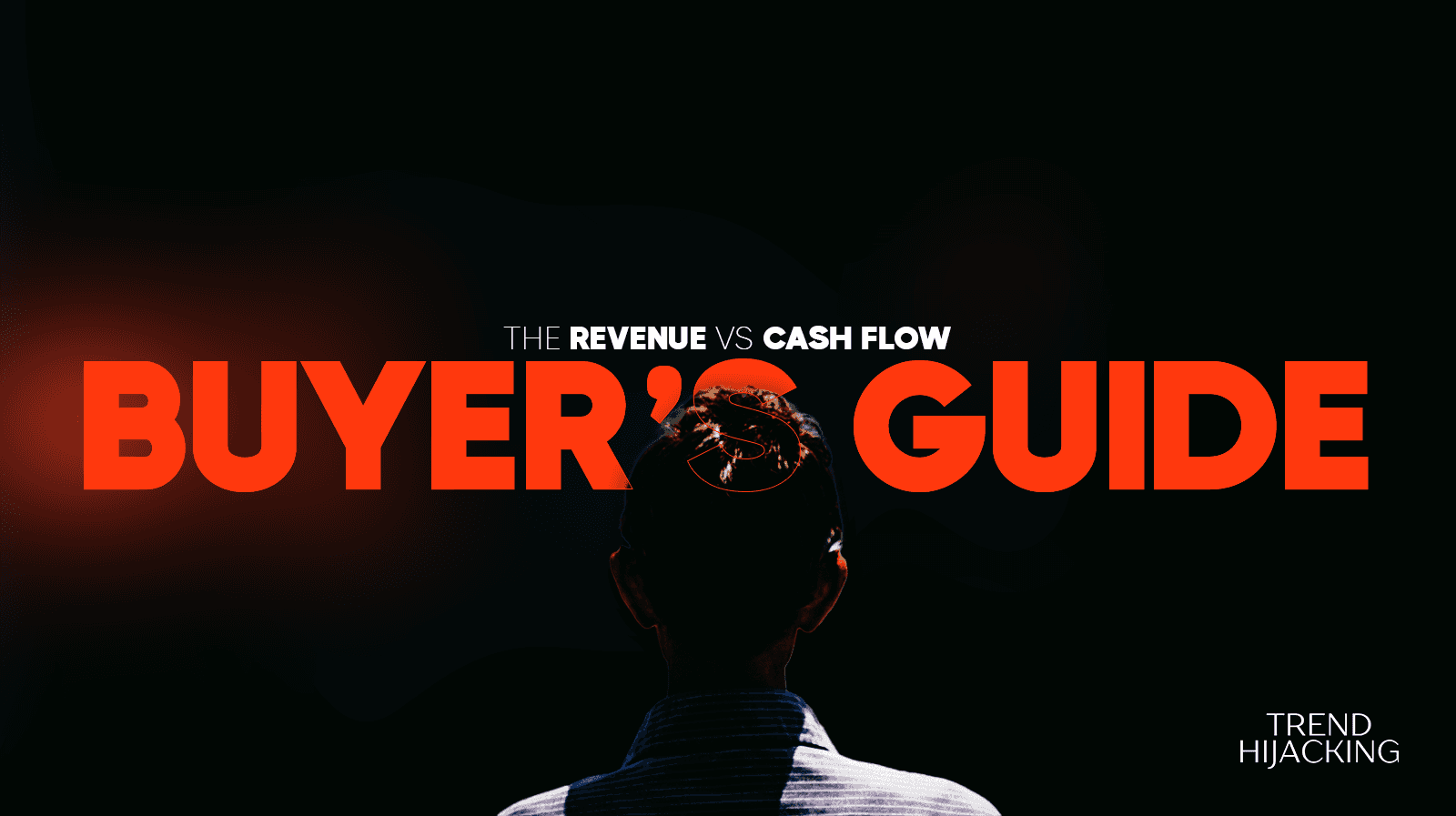
Is Buying Websites Profitable in 2026? The Truth Revealed
If you've been thinking about investing in an online business lately, one of the businesses appearing on your list is websites.
But you might also be having some doubts:
Is buying websites profitable or is it just another overhyped internet scheme?
Can you really purchase a website, grow it, and turn a significant profit?
The TRUTH is:
Buying a website can be incredibly profitable—if you do it right.
Unlike starting a business from scratch, acquiring an established website means inheriting something that already has good traffic, loyal customers, and revenue.
But like any investment, this one isn’t without some risks.
Not every website will work out. And if you don’t know what you’re doing, you might end up with a money pit instead of a money-making asset.
In this guide, we’ll break down whether buying a website is a smart financial move and what factors impact websites' profitability.
Moreover, we’ll share tips on how to minimize risks to maximize your chances of success.
Why Buying Websites Can Be A Profitable Investment

One of the biggest reasons many entrepreneurs choose to buy websites instead of creating them from scratch is time.
Growing a brand-new site can take months—sometimes years—before it starts making money.
But if you buy an established website, you’ll skip the hardest part and step into an existing, functional business.
Below, we take a closer look at KEY reasons why buying a website can be a profitable investment:
1. You Start Earning From Day One
If you acquire a site that’s already making money, then you won’t have to waste time building a customer base or testing monetization strategies.
All that has been taken care of over the months/years the business has been in existence.
In other words, the business is already working.
So you can go ahead and strategize on how to grow it further and increase the revenue it brings in.
2. Existing Websites Come With Existing Traffic
Ask anyone who’d done it before and they’ll confirm this painful truth:
Getting website visitors is one of the hardest challenges you can face when running your online business.
However, dealing with an established website is an entirely new experience.
You simply inherit existing traffic from search engines, social media, and even paid ads.
With such a head start in your online business, you can focus on growth instead of just survival.
3. You Earn Money While You Sleep
Many online businesses are passive income-oriented.
Examples include content websites, some e-commerce business models, and affiliate blogs—all these will generate passive income.
Once you acquire such businesses, you can continue making money with minimal daily effort.
Mind you, this is one of the top reasons why website investing has become so attractive among investors—if done correctly, it becomes a reliable hands-off income stream.
4. High Scalability And Growth Potential
Yes, a well-chosen website on sale isn’t just a source of income for you—it can turn out to be a scalable asset.
You can perform a few tweaks on the website and increase its profitability beyond what the previous owner did. Some of these improvements include:
Improving the site's SEO
Add new revenue streams
Introduce paid ads
Expand the product range
Optimize your site for mobile-first browsing
Improve user experience (UX) to keep visitors engaged
Optimize your website for mobile-first browsing
Enhance the site’s security & trust to build credibility
Unlike a physical business with overhead costs, websites have high scalability potential with relatively low expenses.
We Help You Buy / Build, Manage and Scale E-commerce Brands for an EXIT
E-commerce Simplified for Busy Individuals – We handle the buying, building, and scaling, so you can focus on what matters.
Growth-Focused Strategies – From sourcing to marketing, we drive growth and prepare you for a profitable exit.
Expertly Managed Exits – We build a high-value brand designed for a Lucrative exit.
What Affects A Website’s Profitability?

While the potential is quite high for existing businesses, not all websites are profitable.
Before you buy a premade website, we advise you to check the following factors to help you gauge whether your online business will succeed or struggle:
1. Niche Selection
One important thing to remember when looking for a pre-made niche website to buy is that some industries are naturally more profitable than others.
Websites focused on niches like personal finance, health, or software tools will usually earn more than one about generic hobbies.
The niche you choose directly determines affiliate opportunities, advertising rates, and growth potential.
3. Monetization Methods
The way a website makes money also significantly impacts its profitability.
Some of the most commonly used monetization strategies include:
Affiliate marketing (earning commissions from product referrals)
Display advertising (This includes Google AdSense, Mediavine, etc.)
Selling digital products or courses
E-commerce (dropshipping, print-on-demand, physical products)
Subscription or membership models
Pro TIP: Go for websites with multiple revenue streams. These tend to be more stable as they’re not reliant on just one source of income.
4. Expenses and Profit Margins
Don’t make the mistake many people repeat by basing a website’s profitability on its revenue.
It goes beyond that; it’s about what’s left after expenses.
A website may be generating $10,000 a month in revenue and seem impressive to you. But if the same website costs $9,500 to run, that’s not a great investment.
Always check website expenses (including hosting fees, software subscriptions, marketing costs, and outsourced work) before making a purchase.
What Are the Risks of Buying a Website?

Just like any investment, buying a website comes with its own set of risks. However, if you know how to spot these red flags, you can successfully acquire a profitable website.
Here are the MOST common RED FLAGS to look out for:
1. Fake or Inflated Revenue Claims
Illegitimate sellers are notorious for manipulating revenue figures to make a website seem more profitable than it really is.
Always request verified financial records, check payment histories, and ensure the revenue is sustainable.
2. Google Penalties or SEO Problems
Before buying a website, take the time to assess its SEO health. If you find out that the site relies on black-hat SEO techniques, it's a major red flag—steer clear!
While such a website appears to be doing good at the moment, the truth is that it stands at an extremely high risk of losing all its traffic.
A single Google algorithm update is all takes to wipe the website’s traffic overnight!
Before buying that website, double-check its SEO health, backlink quality, and keyword rankings.
3. Overpriced Listings
Many sellers also have a tendency to overvalue their websites, setting unrealistic price tags.
To beat this, it’s important to understand website valuation multiples. Most online businesses sell for 2-4 times their yearly profit.
If you feel that a site comes with an unnecessarily high asking price, make sure to negotiate a fair price or simply walk away.
4. Dependency on a Single Traffic Source
You should also BEWARE of websites that rely 100% on a single traffic source.
Whether it is Facebook ads, TikTok trends, or a single keyword ranking, such an acquisition can be a risky buy.
The websites for sale are those with diversified traffic sources (organic, social, direct, email marketing) as they’re more stable.
What’s the Best Type of Website to Buy?
There are many different types of websites you can buy today.
Each comes with its own advantages and challenges which you need to know in advance to help you make a more informed decision.
Here’s a breakdown of the most common website types:
1. Content Blogs & Niche Websites

These are websites that generate revenue through monetization methods such as advertising, sponsored content, and affiliate marketing.
Pros:
Low Maintenance: Once built, blogs require less active management compared to e-commerce stores.
Passive Income Potential: You earn revenue from ads and affiliate sales without directly handling products.
SEO & Organic Growth: If a blog has strong rankings, it can generate consistent, free traffic.
Cons:
Slow Revenue Growth: It takes time to build sizable traffic to generate a decent income.
SEO Risks: If Google updates its algorithms, traffic (and revenue) can drop overnight.
Content Creation Required: Blogs need fresh, high-quality content regularly to maintain rankings.
2. Affiliate Websites

Affiliate websites earn commissions by promoting products from platforms like Amazon Associates, ShareASale, or private partnerships.
Pros:
No Product Handling: No inventory, customer service, or order fulfillment is needed.
Scalability: The more traffic you get, the more commissions you earn.
Multiple Monetization Options: Can add display ads, sponsorships, or digital products over time.
Cons:
Dependent on Affiliate Programs: Revenue can be affected if commission rates drop or programs shut down.
SEO-Heavy Business Model: Requires strong search engine rankings to maintain traffic.
High Competition: Many affiliate niches are oversaturated, so it can be quite tough to stand out.
3. SaaS (Software as a Service) Businesses

SaaS businesses refer to online businesses that sell software tools or platforms on a subscription basis. As a buyer, you typically inherit a tech-based company with recurring revenue.
Pros:
Recurring Revenue: Monthly or annual subscriptions ensure consistent income.
High Scalability: Growth isn’t limited by inventory or physical products.
Tech-Driven: Software solutions often have higher profit margins than product-based businesses.
Cons:
Requires Technical Knowledge: If you’re not familiar with software development, you may need a developer team.
Customer Support Needs: Users may require constant support and updates.
High Competition & Churn Rate: Customers can cancel subscriptions easily if they find better alternatives.
4. Membership & Subscription Websites

These websites charge users a monthly or annual fee for access to exclusive content, courses, or communities.
Pros:
Recurring Revenue Model: Membership fees provide stable income.
Community Engagement: A strong member base can create a loyal, long-term audience.
Low Overhead: Many membership sites are digital-based, reducing costs.
Cons:
Constant Content Updates: Members expect regular value (e.g., fresh content, expert interviews, new resources).
Retention Challenges: People cancel subscriptions if they stop finding value.
Marketing-Intensive: It takes time and effort to build a large-paying member base.
5. Dropshipping Stores

Dropshipping is a form of e-commerce where the store owner doesn’t hold inventory—orders are shipped directly from suppliers.
Pros:
Lower Upfront Costs: No need to buy or store inventory.
Easy to Start: A pre-built dropshipping store means you can start selling quickly.
Flexible Product Selection: You can test and switch products without major losses.
Cons:
Lower Profit Margins: Since you don’t buy in bulk, costs per unit are higher.
Supplier Dependence: If suppliers run out of stock or have slow shipping, it affects your business.
Customer Service Issues: Since you don’t control fulfillment, refunds, delays, and complaints can be tricky to handle.
6. E-Commerce Business

When it comes to buying a website, few options offer the same level of profitability and growth potential as an e-commerce business.
Purchasing an established e-commerce store provides you with immediate cash flow, a loyal customer family, and a proven sales history—giving you a strong head start.
Pros of Buying an E-Commerce Business:
Proven Revenue Model: You don’t need to worry about whether the business will work as it’s already generating income.
Built-in Customer Base: Comes with ready buyers, helping you skip the struggle of finding customers.
Brand Trust & Recognition: An established reputation translates to higher conversion rates.
SEO & Marketing Systems: You inherit a website with existing search rankings, email lists, and ads.
Scalability: With the right strategies, you can easily double or even 10x your online shop revenue.
Cons to Consider:
Higher Upfront Cost: A successful e-commerce store may require a larger investment.
Inventory & Operations: Managing stock, fulfillment, and customer service takes effort.
Market Competition: Depending on the store’s niche, staying ahead may require innovation.
We Help You Find & Scale Profitable E-Commerce Businesses…
If you’re considering investing in websites (or simply an online business), we specialize in helping you acquire the best e-commerce deals and scale them to maximize profits.
From due diligence and negotiations to post-acquisition growth, we handle everything for you—so you can focus on success.
Want to buy an e-commerce store and grow it to 2x, 5x, or even 10x revenue? Click Here to see how we can help you secure the perfect investment!
How To Maximize Profit After Buying A Website

Once you acquire a website, you don’t stop there. You’ll need to put in some effort to increase its profitability and get the best return on your investment.
Here are some quick TIPS to consider:
1. Optimize Existing Content: If the site has a blog, be sure to improve older posts, add new keywords, and update outdated information. Optimizing the content leads to higher search rankings and more traffic.
2. Expand Revenue Streams: Don’t just stick to the current monetization method. Look for additional income sources like affiliate partnerships, product sales, or premium memberships.
3. Improve Conversion Rates: Perform small tweaks, like faster site speed, better checkout pages, clearer calls-to-action, etc. These can significantly increase your website sales without needing extra traffic.
4. Leverage Email Marketing: If your newly acquired website has an email list, use it to send promotions, newsletters, or product recommendations. This can help boost repeat sales and engagement.
We Help You Buy / Build, Manage and Scale E-commerce Brands for an EXIT
E-commerce Simplified for Busy Individuals – We handle the buying, building, and scaling, so you can focus on what matters.
Growth-Focused Strategies – From sourcing to marketing, we drive growth and prepare you for a profitable exit.
Expertly Managed Exits – We build a high-value brand designed for a Lucrative exit.
So, Is Buying a Website Profitable?
Yes—if you choose the right website and manage it well, buying a website can be one of the best investments you’ll ever make. Key benefits of buying an established website include immediate cash flow, passive income potential, and long-term growth opportunities.
Remember, a site’s profitability depends on factors like choosing a good niche, verifying traffic and revenue, avoiding overpriced listings, and actively improving the site after purchase.
Looking to invest in a profitable e-commerce business but not sure where to start? We’ll guide you through the process—from finding and acquiring the right store to scaling it for maximum growth. With our proven strategies, we’ll help you increase your ROI by up to 10x. Ready to build your success? Click Here to get started!
A Done-For-You E-commerce Business
Discover how we Build, Launch, and Scale a 6-figure/month Business for You
Learn more
The 6-Step Blueprint to E-Commerce Acquisition
See how we Acquire, Convert, and Scale with Real Case Studies to Prove It.



















